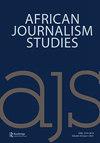东非数字新闻素养的人口差异
IF 1.8
3区 文学
Q3 COMMUNICATION
引用次数: 1
摘要
摘要非洲各国在技术进步方面取得了长足发展,包括互联网和手机接入。这种增长经历不均衡,并带来了一些意想不到的后果,包括错误和虚假信息的传播。先前的研究表明,在进行研究的地区,错误信息和虚假信息是越来越多的问题,但个人的环境、身份和资源水平会影响识字能力。这项研究利用了2021年5月至10月在卢旺达、乌干达和肯尼亚进行的跨国家比较调查的数据(N = 3203),以了解不同的人口统计指标和一个人对其识字率的感知如何影响实际的数字新闻识字率。结果表明,该地区的识字水平适中,媒体扫盲计划需要针对受教育程度较低的公民和/或农村人口,而不是基于性别、年龄或收入针对个人。本文章由计算机程序翻译,如有差异,请以英文原文为准。
Demographic Differences in Digital News Literacy in East Africa
ABSTRACT Nations across Africa have seen substantial growth in technological advancements, including Internet and cell phone access. This growth has been unevenly experienced and has come with some unintended consequences, including the spread of mis- and disinformation. Previous research suggests that misinformation and disinformation are growing problems in the pockets across the region where research has been conducted, but individuals’ circumstances, identities and level of resources impact literacy abilities. This study utilizes data from a comparative, cross-national survey conducted in Rwanda, Uganda and Kenya in May–October 2021 (N = 3203) to understand how varying demographic indicators and a person’s perception of their literacy impact actual digital news literacy. Results indicate moderate levels of literacy in the region and the need for media literacy programmes to target lower-educated citizens and/or rural populations more so than targeting individuals based on gender, age, or income.
求助全文
通过发布文献求助,成功后即可免费获取论文全文。
去求助
来源期刊

African Journalism Studies
COMMUNICATION-
CiteScore
1.90
自引率
10.00%
发文量
18
期刊介绍:
Accredited by the South African Department of Higher Education and Training for university research purposes African Journalism Studies subscribes to the Code of Best Practice for Peer Reviewed Scholarly Journals of the Academy of Science of South Africa. African Journalism Studies ( AJS) aims to contribute to the ongoing extension of the theories, methodologies and empirical data to under-researched areas of knowledge production, through its emphasis on African journalism studies within a broader, comparative perspective of the Global South. AJS strives for theoretical diversity and methodological inclusivity, by developing theoretical approaches and making critical interventions in global scholarly debates. The journal''s comparative and interdisciplinary approach is informed by the related fields of cultural and media studies, communication studies, African studies, politics, and sociology. The field of journalism studies is understood broadly, as including the practices, norms, value systems, frameworks of representation, audiences, platforms, industries, theories and power relations that relate to the production, consumption and study of journalism. A wide definition of journalism is used, which extends beyond news and current affairs to include digital and social media, documentary film and narrative non-fiction.
 求助内容:
求助内容: 应助结果提醒方式:
应助结果提醒方式:


